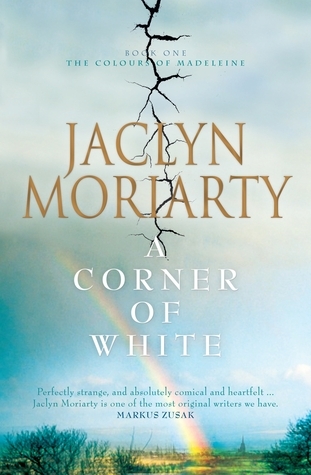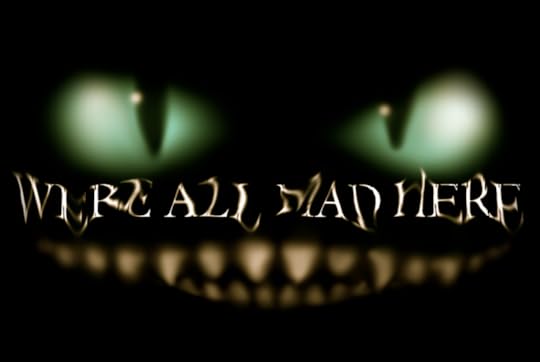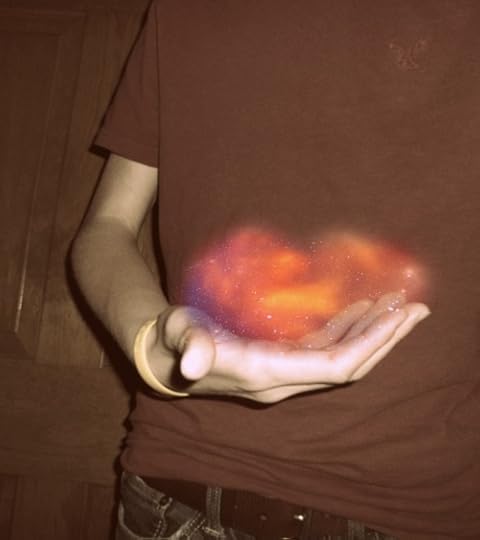What do you think?
Rate this book


400 pages, Paperback
First published September 18, 2012


Madeline and her mother have run away from her life to Cambridge. Elliot is in search of his father in the Kingdom of Cello. Elliot’s story is much more complex than Madeline’s. His family is the talk of his little farming town called Bonfire. Elliot’s father may have killed his uncle and ran away with his Physics teacher and Elliot refuses to believe that. He searches high and low in the Kingdom of Cello hoping to find his father and one day Elliot and Madeline’s two very separate worlds come together in the form of a letter begging for help. This book has a lot going on in 373 pages that feel more like 600. There were times when reading A Corner of White felt more like a chore than reading, but this book is incredibly enjoyable once you get passed the few snags. This book took me over a month to read and I feel incredibly bad that it took so long. I also went way past my library overdue, but what’s a book-loving girl to do? I’m incredibly behind on reviews and am reviewing this quickly before I must return it. Moriarty is quite the lyrical writer. Her story flows and she has so many beautiful quotes; with most lyrical writers there are snags and a few boring bits. Another thing that annoyed me at first was the multiple POVs; there are at least ten different perspectives in A Corner of White. It bothered me at first, but it was mostly because I was only expecting Madeline and Elliot’s POVs. Once I got passed that I would be seeing two different worlds threw different eyes, I got used to the flow of the story and by the end I actually liked the alternating POVs.
I have quite a few questions surrounding the Kingdom of Cello. I don’t know, maybe I’m just not quick to catching on with so many descriptions and different cultures to take in, but I don’t get these Colors at all. From what I’ve gathered, they attack villages and create havoc. There are different Colors and levels and I found that easy to understand, but then Elliot would explain something about manipulating Colors and I was lost and confused. Instead of going back and rereading it multiple times (which only makes me zone out even more) I decided to read on and hope it would be further explained or mentioned. It was mentioned again and I was still utterly confused. I do love the concept surrounding the Kingdom of Cello though and I love where this story ended and is taking off to for the sequel. Before I address any more problems let’s talk about the characters.
The main female character is Madeline. I like Madeline, but at the same time I don’t. She’s an interesting character and she reminds me a lot of someone that would be better suited for Wonderland than the real world.
But then I would remember that she’s only thirteen or fourteen years old and she’s still growing up. Granted I’m not much older than Madeline but her brain is all over the place. She is very bright and intelligent for her age though. She’s quite fascinated with Isaac Newton, which probably seems pointless in this review, but is crucial to the story. I found her little quirks to be amusing and she is a “mad” (by mad I mean slightly crazy) character.
The main male character is Elliot. I will forever remember his last name, which Baranski. I’ve never seen a character’s last name mentioned as much as his was. His name is literally in all the people in the town of Bonfire’s mouths. He is the town’s hero and everyone seems to look up to Elliot, even the adults. Elliot is easier to like than Madeline, but at the same time he’s also easier to hate. I wasn’t even planning on mentioning this, but he ends up dating his best friend, Kayla, and Aside from that, I’m quite fond of Elliot. He is a bit of a condescending player and he doesn’t seem to care a whole lot about other people’s feelings. I hope he gets more character growth in the sequel.
The Villain- I honestly wasn’t expecting the story to take this turn at all. I have feeling there will be politics surrounding the Kingdom in the future and I’m not the biggest fan of that, but I’m a fan of this book and hopefully it’ll be an exception.
There are probably around 50 characters in this book. There are a lot of characters mentioned and all of them are essential to the story in some way, but I’ll talk about a few. From the “Real World” there’s: Jack, Belle, Madeline’s mother, and all of the teachers that home school Jack, Madeline, and Belle. Jack was really annoying at first, but I began to like him further into the book and I liked the small little romance between Jack and Madeline, but I honestly don’t see it going anywhere. Belle, who I think is better suited for Jack and that Madeline needs to open her eyes and see this as well. Madeline’s mother is a refreshing because she isn’t the usual trope of a mother that is never there. I was scared for her towards the end though because Madeline would’ve ended up alone. My favorite of Madeline’s teachers was the one who taught, probably illegally, at Cambridge and gave them an assignment that introduced Madeline to Isaac Newton. In Cello there’s: the Sherriff, Elliot’s mom, Elliot’s cousin, Derwin, the Twinklehams, the princesses, and Elliot’s friends. I really liked the Sherriff and the guy that he worked with. Those POVs were quite interesting and gave a lot of information to the working of Bonfire. I’m quite confused about what happened to the Sherriff at the beginning of the book though.
"By the time he got there, the fifth level Gray had torn bloody stripes into the Sheriff's bare hands and right across the flesh of his face, it had ripped through the cartilage in his knee."
I thought Color attacks were lethal and this sounds pretty serious, but he seemed to heal quickly. I liked Elliot’s mom and one of her talks with Elliot really made me feel for her and how she was dealing with Elliot’s father leaving. Elliot’s cousin (whose name I can’t remember) is very cute and I love how she built the Butterfly Child a house for her to live in before she even arrived in Bonfire, she also made friends with Derwin, a girl that didn’t talk and who I quite liked. The Twinklehams, who I had sympathy for when Elliot’s friends were wreaking havoc on them, the princesses whose columns were featured in the newspapers. I found the princesses to be slightly annoying and ditzy, but I totally wasn’t expecting that ending and I can’t wait to see where all this leads to with Princess Ko.
One of my favorite things about A Corner of White is that this book seems very light and easy to read, but really it is a very dark story. I noticed towards the end of the book that Madeline was the person that did the leaving because she ran away and Elliot was the one who was left by his father. I noticed this before they even realized how they balanced each other out, so I win!
“If you were so happy in your life before, he said, how come you were always running away?”
I also realized thought how Elliot thought Madeline’s initials sounded like empty (M.T.) to be hilariously cute and it was little things like that that made me love the book. This book made me laugh and cry all at once. I had an extreme case of happy tears. 
There is also no romance between Elliot and Madeline and I’m hoping there will be because it will be amazing and it must happen. And I love this quote so here’s a quote:
”You held the fixed stars in place for me and you stopped them from falling.”